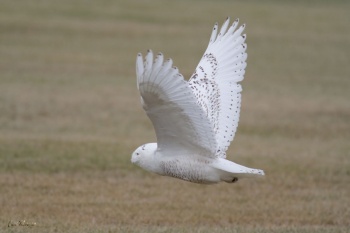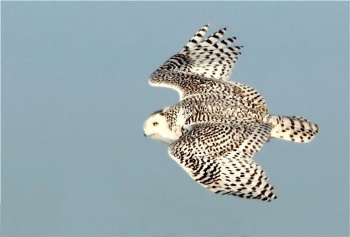(References updated) |
m (→External Links) |
||
| (3 intermediate revisions by the same user not shown) | |||
| Line 1: | Line 1: | ||
| − | [[Image:Snowy_Owl.jpg|thumb|550px|right|Photo by {{user|kidwings|kidwings}}<br />Sauquoit, [[New York]], March 2003]] | + | [[Image:Snowy_Owl.jpg|thumb|550px|right|Photo © by {{user|kidwings|kidwings}}<br />Sauquoit, [[New York]], March 2003]] |
;[[:Category:Bubo|Bubo]] scandiacus | ;[[:Category:Bubo|Bubo]] scandiacus | ||
''Nyctea scandiacus'' | ''Nyctea scandiacus'' | ||
| Line 11: | Line 11: | ||
*Talons and beak black | *Talons and beak black | ||
==Distribution== | ==Distribution== | ||
| − | [[Image:SnowyGrassFlight.jpg|thumb|350px|right|Photo by {{user|CurtMorgan|CurtMorgan }}<br />Argyle, [[New York]], [[USA]], December 2008 ]] | + | [[Image:SnowyGrassFlight.jpg|thumb|350px|right|Photo © by {{user|CurtMorgan|CurtMorgan }}<br />Argyle, [[New York]], [[USA]], December 2008 ]] |
A circumpolar, holarctic species. Found in northern latitudes around the world. In winter, irrupts irregularly to more southerly latitudes every few years. In [[North America]], it can be found slightly more consistently south to the northern US. | A circumpolar, holarctic species. Found in northern latitudes around the world. In winter, irrupts irregularly to more southerly latitudes every few years. In [[North America]], it can be found slightly more consistently south to the northern US. | ||
| Line 22: | Line 22: | ||
==Habitat== | ==Habitat== | ||
| − | [[Image:SnowyWauk 222webFpage.jpg|thumb|350px|right|Juvenile<br />Photo by {{user|earthimages|earthimages}}<br />[[Wisconsin]], [[USA]], January 2009]] | + | [[Image:SnowyWauk 222webFpage.jpg|thumb|350px|right|Juvenile<br />Photo © by {{user|earthimages|earthimages}}<br />[[Wisconsin]], [[USA]], January 2009]] |
Marshes, beaches, and other open areas, often seen on airport runways | Marshes, beaches, and other open areas, often seen on airport runways | ||
==Behaviour== | ==Behaviour== | ||
| Line 35: | Line 35: | ||
The Snowy owl was used in the Harry Potter series as the protagonist's pet and messenger. Snowies can be found in several books and movies, and many birders and non-birders alike have been captivated by their beautiful appearance. | The Snowy owl was used in the Harry Potter series as the protagonist's pet and messenger. Snowies can be found in several books and movies, and many birders and non-birders alike have been captivated by their beautiful appearance. | ||
==References== | ==References== | ||
| − | #{{Ref- | + | #{{Ref-Clements6thAug18}}#Collins Pocket Guide to British Birds 1966 |
#Collins Field Guide 5th Edition | #Collins Field Guide 5th Edition | ||
#Collins Bird Guide ISBN 0 00 219728 6 | #Collins Bird Guide ISBN 0 00 219728 6 | ||
{{ref}} | {{ref}} | ||
==External Links== | ==External Links== | ||
| − | {{GSearch|Snowy | + | {{GSearch|"Bubo scandiacus" {{!}} "Nyctea scandiacus" {{!}} "Snowy Owl"}} |
| + | {{GS-checked}}1 | ||
| + | <br /> | ||
<br /> | <br /> | ||
| − | |||
| − | [[Category:Birds | + | [[Category:Birds]] [[Category:Bubo]] |
Latest revision as of 22:39, 17 January 2023
- Bubo scandiacus
Nyctea scandiacus
Identification
L. 23-28 in (55–64 cm). W. up to 5 ft
- White, with varying amounts of dark barring on its feathers.
- Adult males can be pure white, while immature females show the most barring
- Adult females and immature males are similar in appearance, but males are distinguished by a more extensive white bib and a mostly white nape
- Bright golden eyes
- Feathering on legs and feet
- Talons and beak black
Distribution
A circumpolar, holarctic species. Found in northern latitudes around the world. In winter, irrupts irregularly to more southerly latitudes every few years. In North America, it can be found slightly more consistently south to the northern US.
A long-staying pair bred in the Shetland Islands during the 1960's and '70s.
Taxonomy
This is a monotypic species[1].
Was formerly placed in its own genus Nyctea
Habitat
Marshes, beaches, and other open areas, often seen on airport runways
Behaviour
Will often sit on the ground, rather than a perch.
Flight
Reminiscent of Common Buzzard but will also chase prey in a falcon-like manner.
Diet
In breeding season, predominantly lemmings. Breeding success often depends on the abundance of these rodents. An accomplished hunter. Known to take a wide variety of birds, including ptarmigan, shorebirds, songbirds, and waterfowl, which can even be captured in flight after a pursuit. Another favourite is rabbits and particularly snowshoe hare. Reported to even snag fish from water.
Breeding
The nest is a ground scrape.
In Culture
The Snowy owl was used in the Harry Potter series as the protagonist's pet and messenger. Snowies can be found in several books and movies, and many birders and non-birders alike have been captivated by their beautiful appearance.
References
- Clements, J. F., T. S. Schulenberg, M. J. Iliff, D. Roberson, T. A. Fredericks, B. L. Sullivan, and C. L. Wood. 2018. The eBird/Clements checklist of birds of the world: v2018. Downloaded from http://www.birds.cornell.edu/clementschecklist/download/
- Collins Pocket Guide to British Birds 1966
- Collins Field Guide 5th Edition
- Collins Bird Guide ISBN 0 00 219728 6
Recommended Citation
- BirdForum Opus contributors. (2024) Snowy Owl. In: BirdForum, the forum for wild birds and birding. Retrieved 27 April 2024 from https://www.birdforum.net/opus/Snowy_Owl
External Links
GSearch checked for 2020 platform.1






